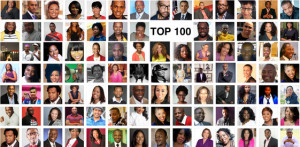Eelan Media recently released its list of the Top 100 Most Influential Black People in Digital and Social Media. The list contains a powerful cross section of global entertainers, politicians, business people and activist. The group is recognized for its blogging, tweeting, Facebook, YouTube and Vine videos, posting on Instagram, Pinterest, Google+ and answering questions on Quora.
Eelan Media clearly explains that “the purpose of this list wasn’t to create a Who’s Who of the rich and famous. Rather it’s purpose is to identify those people who have embraced social media as part of their marketing and communication strategy to HUG – Hear understand and give back incredible value, to their communities.”
This was an incredible task undertaken by Eelan Media and they used the following criteria to collect the people named in the list.
- Being active on more than one social media platform,
- Klout score (Whilst I’ve used this to rank people I did note that there are instances where the score seemed at odds with the individual’s sphere of influence. No one was excluded from the list solely because they weren’t listed on Klout),
- Contributing to publications
- Speaking at major conferences
- Size of community
I applaud Eelan Media for this endeavor as it clearly reflects that black people are utilizing the web for the advancement of black issues. Black people are as present on the Internet as they are anywhere else and our influence is rising. Twitter use among African-Americans is poised to surpass other segments of the population. We have made our presence felt in every facet of the web from online shopping to self-help websites and countless business ventures. But Eelan Media has rightfully pointed out that black speakers are rarely seen at major social media conferences.
We are also facing a vast gap in the presence of black people in the technology field. Overall we represent less than two percent of the technology industry. In an op-ed in USA Today, Information Technology Industry Council chief executive Dean Garfield said Silicon Valley needs the help of everyone from “parents to policymakers” to root out the sector’s “diversity problem.”
In a recent Washington Post story Google released statistics revealing its employee breakdown as an indicator of the diversity problem in the Silicon Valley.
The numbers don’t lie but I do not believe the problem is racial in nature. Perhaps we need to look at how we are educating our children and preparing them for the jobs of the future.

